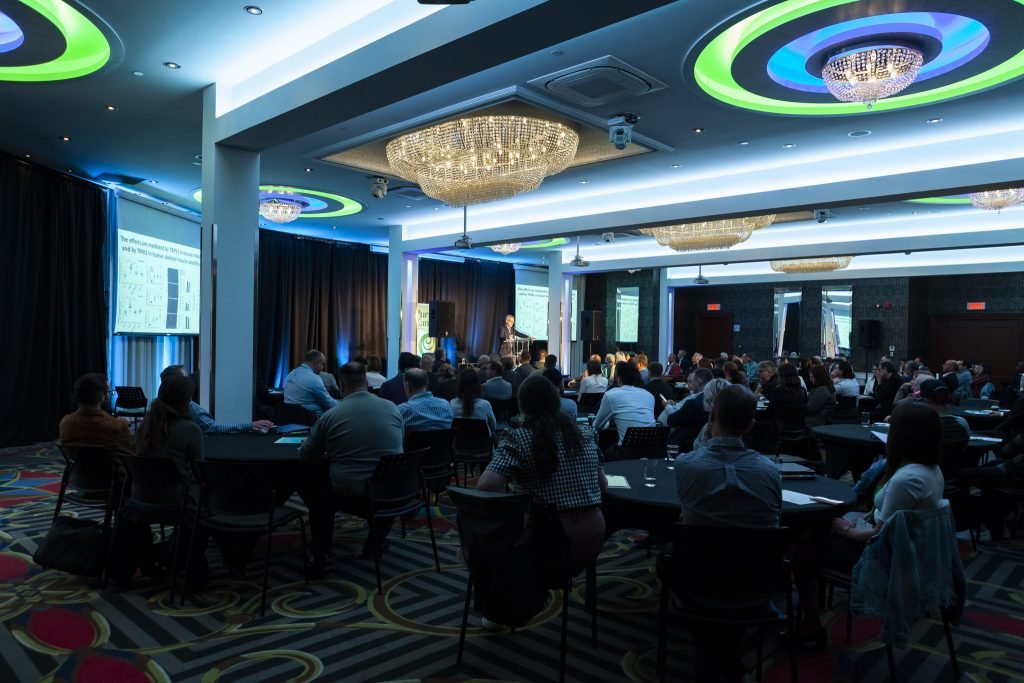June 12 & 13

PROGRAM
Presented by:

8h00 AM - Networking breakfast and kiosks
9h00 AM - Opening remarks
9h15 AM - Harnessing Cannabis: Unlocking New Frontiers in Liver and Viral Disease Management
The legalization of recreational cannabis use has seen a rapid increase in the use of more and more potent cannabis products. Given that legalization has preceded basic research to understand the health effects of cannabis, we are now in a situation where we do not fully understand the effects of a legalized drug that is readily available to the public.
Building upon a robust body of epidemiological research, including studies conducted by our team at INRS–Centre Armand-Frappier Santé Biotechnologie, we are advancing the understanding of how cannabis affects liver diseases and viral infections. Our research is increasingly revealing that the beneficial or detrimental effects of cannabis on health conditions like alcoholic liver disease (ALD), non-alcoholic fatty liver disease (NAFLD), and hepatic viral infections may be critically dependent on the specific composition of the cannabis formulation, its dose, and the duration of use.
Influential studies from our group have demonstrated significant relationships between cannabis use and liver health. For instance, findings suggest that cannabis use is associated with a reduced prevalence of conditions such as steatosis, hepatitis, cirrhosis, and hepatocellular carcinoma, particularly among populations with a history of heavy alcohol use. This research has underscored the potential of cannabis formulation to modulate disease progression through mechanisms that likely involve the endocannabinoid system's interaction with cannabinoid receptors (CBR), known for their role in inflammatory processes and their potential anti-inflammatory properties.
Our ongoing investigations aim to further delineate these interactions by focusing on how different cannabinoid profiles of full-spectrum recreational cannabis formulations affect the pathophysiology of hepatic and viral infections. This knowledge is critical as cannabis use becomes increasingly prevalent, outpacing the scientific understanding of its implications for liver health and disease management. Our research highlights the therapeutic potential of some full-spectrum cannabis formulations, paving new pathways for the treatment and management of hepatic and viral diseases. By integrating data from in-vitro, in-vivo, and epidemiological studies, our work would contribute significantly to the body of knowledge that informs public health policies and clinical guidelines. Ultimately, we seek to guide safe cannabis use, mitigating risks associated with adverse health consequences and promoting a scientific foundation for developing cannabinoid-based therapies.
9h45 AM - Decoding Cannabis Traits: From Genome to Phenome
This seminar explores the intricate genetic landscape of cannabis traits through an integrative approach spanning genomics, phenomics, metabolomics, genome editing, and AI. By deciphering the genetic basis of agronomic, phenological, and metabolic traits, we unravel not only their evolutionary past but also foresee their future trajectories. This knowledge revolutionizes breeding and selection practices, offering targeted interventions for optimized cannabis cultivation. Join us as we delve into the genetic blueprint shaping cannabis diversity.
10h15 AM - Medical cannabis in France: ambitions and challenges
France is building its own model, inspired by those already in place in many countries around the world. After a look back at the French experiment that ended on March 27, 2024, what lessons have been learned? What regulatory framework is being put in place to provide access to medical cannabis for the patients concerned? We'll be looking at prescribing procedures and pharmaceutical circuit specifications for cannabis-based medicines. A regulatory framework conducive to opening up the market?"
11h15 AM - Canada’s leadership in cannabis: a forum for innovative ways to break down barriers
Innovation, Science and Economic Development Canada (ISDE) Forum Cannabis panel - Moderated by Jason Moscovici – Provisions Legal Services Inc.
1h20 PM - Cannabis Clinical Research: Challenges and Progress
1. Introduction: Background and Importance of Cannabis Clinical Research
2. Regulations and the distinction between Recreational, Medical and Pharmaceutical Cannabis
3. Types of Clinics and Methodologies Used in Cannabis Research
4. Examples of Current Research and Future Areas of Development
5. Positioning PurCann Pharma in the Cannabis Clinical Research Sector
1h45 PM - Pain Management
Among the treatments for non-cancer chronic pain, cannabinoid-based treatments have become extremely popular. Evidence remains modest and is primarily limited to delta-9-tetrahydrocannabinol (THC) for neuropathic pain; nevertheless, the use of various cannabinoid-based medicines (CBMs), including oral cannabidiol (CBD), to treat neuropathic, nociceptive, and mixed pain has increased worldwide. During clinical evaluation, identifying the pain mechanism can guide the most appropriate management, but cannabinoid-based treatments are rarely considered . This presentation will describe the role cannabinoids can play in managing chronic pain and present the results of an observational study on patients with non-cancer chronic pain.
2h15 PM - From Desperation to Innovation: A Physician's Journey with Medical Cannabis
Join us for an inspiring keynote presentation as Dr. Anderson shares their deeply personal journey navigating the challenges of managing their son's intractable epilepsy. Faced with the limitations of traditional anti-epileptic treatments, Dr. Anderson embarked on a mission to explore alternative therapies, ultimately pioneering a groundbreaking approach to incorporating cannabinoids into patient care.
Through her consult-based practice, Dr. Anderson integrates cannabinoid medicine into the treatment plans of patients spanning a wide age range and diverse medical conditions, including epilepsy, autism, chronic pain, and anxiety/depression. From infants to centenarians, Dr. Anderson provides hope and a lifeline to those who have exhausted conventional treatment options.
Drawing from her experiences in both hospital and emergency room settings, Dr. Anderson will shed light on the transformative potential of medical cannabis and the critical role it plays in advancing the field of medicine. Prepare to be inspired by a story of resilience, innovation, and compassionate care as Dr. Anderson shares her journey from desperation to innovation in the rapidly evolving realm of medical cannabinoids.
4h10 PM - Discussion moderated by Jason Moscovici – Provisions Legal Services Inc.

4h30 PM - Panel moderated by Nathan Mison - A Cannabis North American Market - Insights into Canada and The United States as New Regulatory Regimes are Developed
11h15 AM - An Overview of Irradiation Effects on Cannabis Processing
As an agricultural product, cannabis, including its seeds, can be exposed to contamination with pathogenic fungi, bacteria, yeast, and mold during growing, drying, packaging, and delivery, which poses health risks for consumers. Radiation technologies such as gamma and electron beam (E-beam) irradiation are commonly used treatment methods to address many of the safety concerns with cannabis. In this presentation, we will discuss irradiation effects on cannabis including the benefits and risks of not irradiating cannabis products, the similarities and differences of E-beam and gamma processing, exporting product and requirements to the EU, and a brief summary of new irradiation facilities in Canada.
11h30 AM - Supplying Quebec's industrial plant sector: from agriculture to industry
Let's explore the many potentials of the industrial plant value chain, mainly through cannabis' colleague, industrial hemp. We'll take a look at this ecosystem of innovation and entrepreneurial research and development that has been developing over the last ten years in Quebec with biobased materials. What are the challenges and advances, from the field to 1st and 2nd transformation?
Industrial plants are plants that are primarily intended for manufacturing processing. They have non-food applications in fields such as construction materials, polymer processing (plastics incorporating biobased fibers), technical textiles, packaging, cosmetics, biofuels, etc.
Converging interests are emerging, both among manufacturers who want to source eco-responsible, renewable, local and low-carbon materials, and among agricultural producers who want to increase crop rotation potential and diversify their income.
Our objectives are to increase the sector's economic value by increasing the number of products marketed using bio-sourced materials, to strengthen the supply of industrial plants, and to ensure better consultation and collaboration between the various stakeholders in this value chain in order to rally the strengths and complementarity of networks.
1h50 PM - Exploring the possibilities of a circular economy for a sustainable, environmentally-friendly cannabis industry
***This program is preliminary and subject to change according to participants’ confirmations.***
This event is poised to not only facilitate communications between provincial oversight bodies and wholesale distributors but also to enrich professional networks with cannabis decision makers and licensed producers. The location also provides an unforgettable experience in one of Canada’s most picturesque cities.
We eagerly anticipate your presence in Quebec City, where industry synergy and cultural exploration await!










































